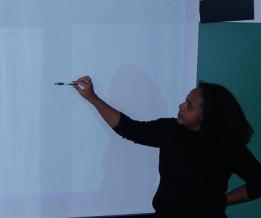scientific diffusion Seminars and Agenda The dynamics of race and class in inclusive settings
The dynamics of race and class in inclusive settings
Researcher Marcia Lima (CEM / CEBRAP / USP) presents on the partial results of research that develops “the dynamics of race and class in inclusive settings.” In her talk, she highlighted: a research agenda, inclusion problems, the convergence between the research agendas of CEM / INCT, ESRC (Economic and Social Research Council) and the Ford Foundation, including the initial findings.
POST-EVENT
In her presentation, researcher Marcia Lima (CEM / CEBRAP / USP) expounded on the partial results of research that develops “the dynamics of race and class in inclusive settings.” In her talk, she highlighted: a research agenda, inclusion problems, the convergence between the research agendas of CEM / INCT, ESRC (Economic and Social Research Council) and the Ford Foundation, including the initial findings.
The initial objective of the research involves elucidating the analytical capabilities of the variable “race” in the analysis of the phenomena of production and reproduction of poverty and inequality.
The analysis considers both contexts, marked by high levels of poverty and segregation and space, in Cidade Tiradentes (São Paulo) and Bairro da Paz (El Salvador) and the effect of race.
In her presentation, Lima addressed, among other points, some of the initial findings of the research team, which reveal general descriptive data as the first significant effects of inclusion policies, built against a backdrop of inequality. Lima highlighted the example that choices tend to influence public policy.
The changes promoted by the policies that seek to further investigate these characteristics initially point out that “the system is able to retain more people in teaching than include new, in all its years of study.”




